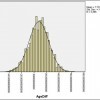Resumen
Continuing the Savvy Survey Series, this fact sheet is one of three focused on working with your survey data. In its most raw form, the data collected from surveys do not tell much of a story except who completed the survey, partially completed it, or did not respond at all. To truly interpret the data, it must be analyzed. Where does one begin the data analysis process? What computer program(s) can be used to analyze data? How should the data be analyzed? This publication serves to answer these questions. This 7-page fact sheet was written by Milton G. Newberry, III, Jessica L. Gouldthorpe, and Glenn D. Israel, and published by the UF Department of Agricultural Education and Communication, August 2014.
AEC409/PD080: The Savvy Survey #16: Data Analysis and Survey Results (ufl.edu)
Citas
Agresti, A. & Finlay, B. (2009). Statistical methods for the social sciences. (4th ed.). Upper Saddle River, NJ: Pearson Prentice Hall.
Huck, S. W. (2004). Reading statistics and research. (4th ed.). Boston, MA: Pearson Education Inc.
Salant, P. & Dillman, D. A. (1994). How to conduct your own survey: Leading professionals give you proven techniques for getting reliable results. New York, NY: John Wiley & Sons, Inc.
Tuckman, B. W. (1999). Conducting educational research. (5th ed.). Orlando, FL: Harcourt Brace College Publishers.
Vogt, W. P. (2005). Dictionary of statistics & methodology: A nontechnical guide for the social sciences. (3rd ed.). Thousand Oaks, CA: Sage Publications. https://doi.org/10.4135/9781412983907

